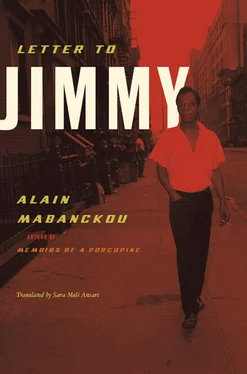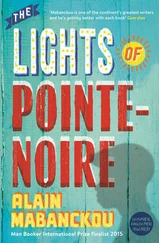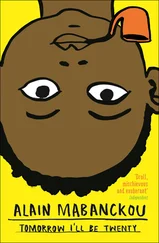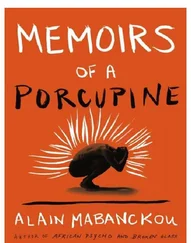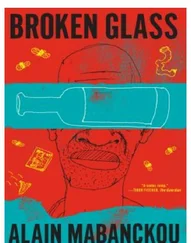Greenwich Village is the site of a burgeoning African-American culture, for young people who want to change the world with their dreams. In this place, daily life resembles their destiny: unstable, wandering, but with no lack of projects. It is a community founded on team-work. Thanks to Delaney, you develop your artistic awareness, and your passion for music, above all for blues and jazz. Even though you have been imagining it for a while, it is Emile Capouya who convinces you to definitively abandon preaching. You are seventeen.
With only a high school diploma, it is not exactly as if your future is laid out before you. Your craft requires certain sacrifices with which you comply. You take on odd jobs in Greenwich Village until your father’s death. As destiny would have it, on the day of your father’s passing, on July 29, 1943, your sister Paula is born.
At the Calypso restaurant, where you work as a waiter, you see a lot of people come and go. Most of the biggest writers and artists of the day come to dine here. Your homosexuality is no longer a secret to anyone, and you even come out to your protector, Emile Capouya. During this time, you also begin writing what will become your first novel, Go Tell It on the Mountain, and you meet your mentor, Richard Wright, to whom you will submit a number of pages from your manuscript, for the first time. You read everything you can get your hands on. You devour European literature; you are seduced by Balzac, James, Flaubert, and Dostoyevsky, among others. .
1946 is made the darkest of years with the suicide of your friend Eugene Worth, to whom you never had the chance to reveal your feelings. This dramatic event affects you, and is one of the reasons that speed up your departure from your country.
•••
In 1948, at the age of twenty-four, you dream of leaving behind everything that is dear to you, of leaving America — your homeland — because, according to you, “it was necessary.” You want to follow the trail blazed before you by black American artists and writers no longer willing to endure the abuses inflicted upon them by a system of politically sanctioned racial segregation. These artists and writers had exported their cultural movement, the Harlem Renaissance, to Paris, finding in the French capital and “in the excitement of the cabarets what used to seduce them in Harlem: the vibrating pulse of new cultural blood.” 32The wave of these black migrants is impressive, and includes poets you frequent and novelists you admire, like William Du Bois and Langston Hughes, but also stars of the stage, among whom Josephine Baker is the most famous. France should, theoretically, allow you to escape from your demeaning status of Black American Man. However, you do not renounce your country: “I love America more than any other country in this world, and, exactly for this reason, I insist on the right to criticize her perpetually.” 33
And so, some time later, while visiting the United States after an absence of several years, you are asked by the media about your adopted country. You make no concessions to her: you say you could just as easily live somewhere in Africa, Asia, or in the Third World. Later, you would, in fact, go on to live in Turkey and in Switzerland. . But you have friends in France, even if this country, according to you, is a “hermetic” place, often marked by arrogance and “smugness” among its intellectuals and elite class. Still, you love France more than ever, and you certainly do not want to speak badly of a former lover, one who took you in her arms, opened her doors to you, and did not judge you on your physical appearance. 34
•••
People would argue for a long time about the real reasons behind your “exile” in France. But the truth is that there is nothing more disheartening that the imprisonment of a creative person, nothing worse than the feeling that the world collapsing before you will swallow your dreams in the end. In the 1940s, the dreams of African-Americans are targets of a hellish political beast in your homeland. Living in your country is no “picnic for black people.” The nearest tree could be your gallows without any form of trial, and meanwhile President Roosevelt faces opposition in Congress against passing anti-lynching laws. Overt segregation is commonplace in restaurants, schools, and in most public places. Your illustrious colleagues who preceded you in France emphasize their feelings of being writers in their own right, instead of being people entirely devoid of rights. In France, they are not considered black: they are artists, first and foremost, writers who capture the attention of the intellectual scene in their adopted country. Gone are the days of humiliation endured in their own country; the chance to create in peace, far from racial discrimination, is open to them.
Later you will admit that you wanted to live in a place where you could write without the feeling of being choked. France became the place where you blossomed, where you truly began to fight with the weapons at your disposal that no one could take away: words. 35
3. in the footsteps of Professor Wright
You arrive in Paris on November 11, 1948.
You live in small hotels, first in the rue du Dragon, then in the rue de Verneuil, not far from the Boulevard Saint-Germain, in rooms often rented to students, whose landlords must be indulgent at the end of the month when it comes time to collect the rent.
You pick up the Bohemian life you had been living in Greenwich village very easily. Reading Henry James enthralls you, while at the same time the people of Saint-Germain bore you. You prefer instead the common people you encounter in cafés, and the North Africans and black Africans with whom you discuss their situation. Nevertheless, as this is the fate of expatriates, you also dine in the homes of your — usually white — fellow countrymen. During this period, you meet Saul Bellow, among others.
Your quest for your own identity explains your participation in these gatherings. You are caught in the trap of frequently spending time with your white fellow Americans. If such a situation helps you to better understand yourself, outside of the issue of race, it cuts you off for some time from French society, whom you frequent very little — you do not yet speak French, which does not help you meet anyone. Meeting other Americans reveals a shocking reality to you: the white American is as lost as you are, and, throughout the course of your discussions, everyone avoids the problem at the core of American society — the question of race. It is far easier to evoke the beauty of the Champs-Elysées or of the Eiffel Tower. .
Your mentor Richard Wright is already in Paris with his family. When you left New York, you had hidden the address of this venerable writer in your bag, as if it were a good-luck charm. Back home, he had always supported you, even helped you, in becoming an “honest man and a good writer.” And to some extent, even if you never clearly admitted this, it is because Wright is in the French capital that you feel comfortable with the idea of going there yourself.
People in the literary circle of black American exiles in Paris — a social circle Michel Fabre calls the “black bank”—know that a young author from Harlem is arriving. They had heard of him thanks to several articles published in various magazines and literary journals. Some had known him in Greenwich Village, while others were set to discover at last this “young, tense man, slight in stature, with extravagant hand gestures and a facial expression that could veer from tragic to comic. .” 36
This environment reminds you of the circumstances in which you met Richard Wright in New York, at the end of 1944. At this time, you are twenty years old. Wright, at thirty-six, is already famous thanks to his novels, especially Native Son . He is the first black American to have published a bestseller, and the tale that he narrates in his novel, about Bigger Thomas, a man of color who murders a rich white woman who is in love with him, incites a fury of protest. His comrades in the Communist Party in particular criticize him for portraying such a negative image of a black man. Be that as it may, Wright had achieved his goal: to expose the reality of American society, to express through Bigger Thomas’s character what you would later describe as “fury” and “hatred”, as a challenge to an America deaf to the demands of blacks.
Читать дальше
